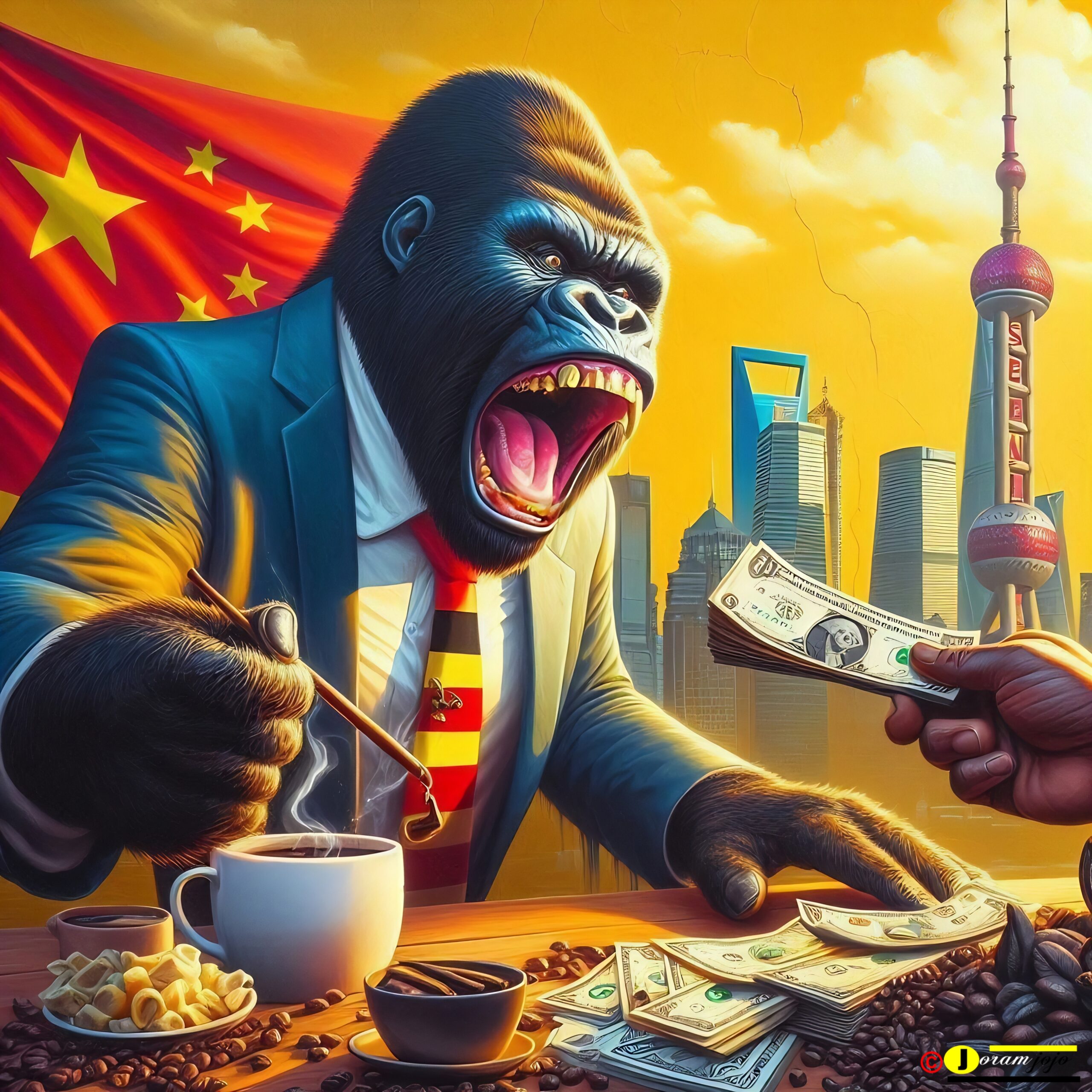From Coffee to Vanilla: How US Tariffs Threaten Uganda’s Key Exports
In a world increasingly defined by shifting trade dynamics, the ripple effects of global economic policies often hit hardest in places least equipped to absorb the shock. For Uganda—a nation striving to harness its demographic dividend and position itself as an emerging market powerhouse—Donald Trump’s recent imposition of a 10% tariff on Ugandan goods exported to the United States presents both a challenge and an opportunity for reflection. These tariffs, framed within the Trump administration’s broader agenda to combat “unfair trade practices,” come at a precarious time for Uganda. Having already lost its preferential trade status under the African Growth and Opportunity Act (AGOA), this new levy threatens to further destabilise key sectors like coffee and vanilla, which are linchpins of the country’s export-driven growth strategy. But beyond the immediate economic implications lies a more profound question: how will Uganda navigate these turbulent waters, and what lessons can be drawn from this moment of adversity?

A Nation at a Crossroads
Uganda’s economy has demonstrated resilience over the past decade, with average annual growth hovering around 5.1%, slightly surpassing its stubbornly high population growth rate of 3.1%. However, this growth has been uneven, driven primarily by within-sector productivity gains that have slowed significantly in agriculture—a sector employing nearly 70% of the population. The introduction of tariffs on Ugandan exports to the U.S., coupled with the loss of AGOA benefits, compounds existing vulnerabilities. For a country heavily reliant on agricultural exports, particularly coffee and vanilla, these external shocks risk undermining years of progress in building export-oriented industries.

The timing could scarcely be worse. Uganda is on the cusp of its demographic dividend window—a transitional period when advances in health, education, and social welfare yield a large pool of potential workers with fewer dependents. This demographic shift offers a unique opportunity to accelerate economic growth, provided the right investments are made in human capital and infrastructure. Yet, the dual pressures of tariffs and AGOA suspension threaten to derail these aspirations by stifling export revenues and reducing fiscal space for critical investments.
Immediate Economic Implications
The immediate impact of Trump’s tariffs is felt most acutely in Uganda’s agricultural sector, which accounts for more than half of all exports. Coffee, Uganda’s largest export commodity, faces declining competitiveness in the U.S. market due to higher costs introduced by the 10% levy. Similarly, vanilla producers—who already grapple with price volatility and regulatory hurdles—are likely to see shrinking margins and reduced demand. These challenges exacerbate broader structural issues, such as low productivity in subsistence farming and inefficient talent allocation, which undermine the effective use of human capital.

Moreover, the tariffs compound risks posed by other global regulations, such as the European Union’s Anti-Deforestation Regulation (EUDR). Compliance with EUDR requires geolocation data for all coffee farms and farmers to verify adherence to deforestation-free practices. While this initiative aims to enhance market access, it highlights systemic vulnerabilities, including limited documentation capacity among smallholder farmers. Together, these measures create a perfect storm that threatens to squeeze Ugandan producers out of lucrative Western markets.
Beyond the Immediate: Lessons from Adversity
Yet, amidst these challenges lies an opportunity for Uganda to recalibrate its strategies and build resilience against future shocks. The crisis underscores the importance of diversifying export destinations and reducing dependence on any single market. Regional integration within frameworks like the East African Community (EAC) and the African Continental Free Trade Area (AfCFTA) offers promising alternatives to declining Western markets. Strengthening intra-African trade could create larger, more integrated economies of scale, enabling Ugandan producers to compete effectively closer to home.

Additionally, the tariffs highlight the urgent need for value addition in agriculture and manufacturing. By transitioning from exporting raw materials to producing processed goods—such as roasted coffee or flavoured vanilla extracts—Uganda can enhance product competitiveness and fetch higher prices in alternative markets. This shift aligns with efforts to comply with stringent regulations like EUDR while differentiating Uganda as an ethical supplier committed to environmental stewardship.
Harnessing Human Capital for Long-Term Growth
Ultimately, Uganda’s ability to navigate these turbulent waters hinges on its commitment to investing in human capital. Early childhood development (ECD) programs, which ensure children receive essential nutrition, healthcare, and education, are crucial for transforming Uganda’s youthful population into a valuable economic asset. As highlighted in recent reports, each additional year of schooling increases an individual’s earnings by approximately 12.5% in Sub-Saharan Africa. By prioritising ECD, Uganda can lay the foundation for a skilled workforce capable of driving non-oil sector growth and fostering inclusive prosperity.

Furthermore, empowering women—currently constrained by unpaid care work—through affordable childcare services and targeted support could unlock significant economic benefits. Women entrepreneurs represent a critical yet underutilised segment of Uganda’s economy. Enhancing their participation would boost household incomes and contribute to broader economic transformation.
A Broader Perspective
The story of Uganda’s response to Trump’s tariffs resonates far beyond its borders. It serves as a microcosm of the struggles faced by many African nations navigating an increasingly fragmented global economy. Whether Uganda emerges stronger or falters under pressure will depend on its ability to turn adversity into opportunity—a challenge that resonates deeply across Africa and beyond. By embracing innovation, fostering regional cooperation, and prioritising sustainable growth, Uganda can transform this crisis into a catalyst for lasting change. As the world watches, the choices made today will shape not only Uganda’s future but also offer valuable lessons for others walking similar paths.

The Global Context
Trump’s Trade Agenda
Donald Trump’s presidency was marked by a staunchly protectionist trade agenda, which sought to recalibrate the United States’ economic relationships with the rest of the world. Central to this agenda was the belief that many nations had exploited open markets to the detriment of American industries and workers. Trump’s administration argued that decades of free trade agreements had led to a significant trade imbalance, where the U.S. imported far more than it exported, particularly from countries in Asia and Africa. To address what he termed “unfair trade practices,” Trump introduced a series of tariffs on imports from various countries, including those perceived as benefiting disproportionately from preferential trade programmes like the African Growth and Opportunity Act (AGOA).

In the Ugandan and African context, these policies were not merely abstract notions but tangible actions with real-world consequences. For instance, Trump’s tariffs targeted key agricultural exports from Africa, such as coffee and vanilla, which are vital to Uganda’s economy. These measures were intended to protect American farmers and manufacturers while pressuring other nations to renegotiate trade deals on terms more favourable to the U.S. However, for smaller economies like Uganda’s, such policies risked undermining years of progress in building export-oriented industries.
Impact Beyond Borders
The ripple effects of Trump’s protectionist policies extend far beyond the borders of the United States, affecting both large economies and smaller developing nations alike. While larger economies like China and the European Union have the resources to retaliate or adapt, smaller nations often find themselves caught in the crossfire with limited room to manoeuvre. For Uganda, the implications are profound. As a country striving to diversify its economy and reduce reliance on traditional sectors like agriculture, these tariffs threaten to stifle growth at a critical juncture.
For example, Uganda’s recent economic resilience—bolstered by strong performances in agriculture, manufacturing, and services—could be undermined by reduced access to key markets. With inflationary pressures subsiding across Sub-Saharan Africa and Uganda’s economy demonstrating steady recovery post-pandemic, the imposition of tariffs introduces new vulnerabilities. These measures disrupt not only export revenues but also broader efforts to attract foreign direct investment (FDI) and integrate into global value chains. In essence, what may seem like a domestic policy decision in the U.S. has far-reaching consequences for nations like Uganda, whose economic fortunes are increasingly tied to global trade dynamics.
Loss of AGOA Benefits
Prior to the suspension of benefits under the African Growth and Opportunity Act (AGOA), Uganda enjoyed duty-free access to one of the world’s largest consumer markets—a privilege that significantly boosted its export-driven growth strategy. AGOA was instrumental in fostering economic ties between the U.S. and eligible African nations, allowing them to export thousands of products without facing tariffs. For Uganda, this meant expanded opportunities for its coffee, vanilla, and textile industries, which collectively contribute substantially to employment and foreign exchange earnings.
However, the loss of AGOA benefits compounded the challenges posed by Trump’s tariffs. Without duty-free access, Ugandan goods became less competitive in the U.S. market, leading to declining export volumes and revenue shortfalls. This blow came at an especially precarious time, as Uganda grapples with the need to create jobs-rich economic transformation and invest in human capital to harness its demographic dividend. The absence of AGOA privileges forced Uganda to explore alternative markets within Africa and Asia, though such pivots require time and significant investment in infrastructure and value addition.

Moreover, the suspension highlighted the fragility of relying heavily on external trade preferences. It underscored the importance of diversifying export destinations and enhancing domestic production capacities to withstand global economic shocks. For Uganda, the lesson is clear: while international partnerships remain crucial, self-reliance and regional integration must be prioritised to ensure sustainable growth amidst evolving global trade landscapes.
Uganda’s Current Economic Landscape
Export Dependence
Uganda’s economy is heavily reliant on exports, with agricultural products such as coffee, vanilla, and other cash crops accounting for over half of the country’s total export earnings. According to recent data, merchandise exports from Uganda grew by nearly 46% in FY2023/24, building on a 42% increase reported in FY2022/23. This robust performance underscores the critical role that exports play in driving Uganda’s economic growth. Coffee alone, which constitutes more than 60% of Uganda’s exports to the European Union (EU), serves as a lifeline for millions of smallholder farmers and contributes significantly to foreign exchange earnings. Vanilla, another key export, has also seen rising global demand due to its premium value.

However, this heavy dependence on a narrow range of export commodities exposes Uganda to external shocks, including policy changes like Donald Trump’s tariffs or regulatory hurdles such as the EU Anti-Deforestation Regulation (EUDR). For instance, disruptions in access to traditional markets like the U.S. and EU could severely impact not only export revenues but also livelihoods tied to these sectors. The introduction of tariffs threatens to make Ugandan goods less competitive abroad, potentially reversing years of steady progress in expanding export volumes and diversifying trade partners.
Recent Growth Trends
Before the imposition of tariffs, Uganda’s export sector demonstrated remarkable resilience and growth despite broader global uncertainties. In FY2023/24, Uganda recorded an impressive 6.1% GDP growth rate, driven largely by gains in agriculture, manufacturing, and services. Merchandise exports surged, reflecting strong contributions from agricultural produce and emerging sectors like minerals. Notably, exports to key destinations such as the United Arab Emirates (UAE) and India accounted for approximately three-quarters of the total increase during FY2023/24, highlighting Uganda’s efforts to diversify beyond traditional Western markets.

This upward trajectory, however, risks being derailed by protectionist measures like Trump’s tariffs. With the U.S. being a significant market for Ugandan goods—particularly agricultural products—the added cost burden introduced by the 10% levy could dampen demand and disrupt established supply chains. Such disruptions would affect current export levels and hinder Uganda’s ability to sustain its momentum in international trade.
Agriculture as a Pillar
At the heart of Uganda’s economy lies agriculture, which accounts for nearly 70% of employment and provides livelihoods for millions of households across rural areas. The sector is pivotal to the nation’s development agenda, given its dual role in ensuring food security and generating income through exports. Despite challenges such as low productivity and limited modernization, agriculture remains the backbone of Uganda’s economy, contributing more than half of all export earnings.

For example, coffee—a major agricultural export—has long been a cornerstone of Uganda’s trade strategy. It supports over 1.7 million smallholder farmers and generates substantial foreign exchange revenue. Similarly, vanilla production has emerged as a high-value crop, attracting global buyers and boosting local incomes. Beyond these cash crops, subsistence farming dominates much of the rural landscape, providing sustenance and modest earnings for countless families.
Yet, the centrality of agriculture also highlights vulnerabilities. Slow productivity growth in the sector, driven by factors like underinvestment in technology, inadequate infrastructure, and climate-related shocks, continues to impede broader economic transformation. Moreover, policies targeting Ugandan agricultural exports—for instance, the EUDR or Trump’s tariffs—pose direct threats to the livelihoods of millions who depend on farming for survival. Improving agricultural earnings even marginally has the potential to boost consumer demand among Uganda’s predominantly rural population, underscoring the need for targeted investments in this sector.

In conclusion, while Uganda’s economy has shown commendable resilience and growth in recent years, its reliance on agricultural exports makes it acutely vulnerable to external pressures. Addressing these challenges requires diversifying export destinations and enhancing domestic capacities to withstand global economic shifts. As Uganda navigates this complex terrain, prioritizing sustainable agricultural development will remain essential to safeguarding both economic stability and human well-being.
Immediate Impacts of the Tariffs
Increased Export Costs
The imposition of a 10% tariff on Ugandan goods exported to the United States represents a significant financial burden for local producers. For a country like Uganda, where agriculture and manufacturing often operate on thin margins, this additional levy directly increases the cost of exporting key products such as coffee, vanilla, and textiles. For instance, Ugandan coffee exporters—who already face stiff competition in global markets—must now contend with higher costs that erode their profit margins. These tariffs effectively raise the price of Ugandan goods in the U.S. market, making them less attractive to American buyers who may opt for cheaper alternatives from countries not subject to similar levies.

Moreover, the added costs are not limited to large-scale exporters; smallholder farmers and informal traders also bear the brunt. Many Ugandan producers lack the economies of scale or technological advancements to absorb these increased expenses without passing them onto consumers or accepting reduced profits. This creates a precarious situation where even minor shifts in pricing can render Ugandan goods uncompetitive, undermining years of effort to establish footholds in international markets.
Market Competitiveness
Higher prices resulting from the 10% tariff could significantly diminish the competitiveness of Ugandan goods in the U.S. market. Consumers and businesses in the U.S. are likely to prioritise affordability when choosing between similar products, especially if substitutes from non-tariffed countries are available at lower prices. For example, if Brazilian coffee or Indonesian vanilla enters the U.S. market duty-free or at lower tariff rates, Ugandan producers risk losing market share despite the premium quality of their offerings.

This loss of competitiveness is particularly concerning given Uganda’s dependence on agricultural exports. Coffee, which constitutes over 60% of Uganda’s exports to the European Union (EU), faces similar challenges under regulations like the EU Anti-Deforestation Regulation (EUDR). Combined with Trump’s tariffs, these measures create a dual pressure that threatens to squeeze Ugandan producers out of lucrative Western markets. The cascading effect could lead to reduced export volumes, forcing producers to seek alternative markets in Africa or Asia. However, establishing new trade relationships takes time and investment, leaving many Ugandan businesses vulnerable in the interim.
Revenue Decline
The decline in export revenues stemming from reduced competitiveness poses a severe threat to Uganda’s economy. Recent data shows that merchandise exports from Uganda grew by nearly 46% in FY2023/24, driven largely by strong performances in agriculture and emerging sectors like minerals. However, the introduction of tariffs risks reversing this progress. For instance, if Ugandan coffee exports to the U.S.—a major destination—decline by even 20%, the resulting revenue shortfall could run into millions of dollars annually.

This decline has far-reaching implications beyond individual producers. Reduced export earnings translate into lower foreign exchange reserves, placing pressure on Uganda’s balance of payments. Additionally, the government relies heavily on export-related revenues to finance critical public expenditures, including investments in health, education, and infrastructure. A decline in export revenues could force cuts to development projects or necessitate increased borrowing to bridge fiscal gaps. Given Uganda’s already elevated public debt levels, this scenario raises concerns about long-term fiscal sustainability.
Furthermore, the ripple effects extend to rural communities, where over 70% of the population depends on agriculture for livelihoods. Reduced export revenues could lead to lower incomes for smallholder farmers, exacerbating poverty and hindering efforts to achieve Uganda’s demographic dividend. With limited alternative sources of income, many households may struggle to meet basic needs, further straining social safety nets and increasing vulnerability to economic shocks.

In summary, the immediate impacts of Donald Trump’s tariffs highlight the interconnectedness of global trade and local economies. For Uganda, the stakes are high: addressing these challenges requires not only short-term mitigation strategies but also long-term investments in diversification, value addition, and regional integration to build resilience against future external pressures.
Sector-Specific Challenges
Coffee Crisis
Uganda’s coffee sector, a cornerstone of the nation’s economy, finds itself at the heart of a brewing crisis exacerbated by both Donald Trump’s tariffs and stringent regulatory measures like the European Union (EU) Anti-Deforestation Regulation (EUDR). Coffee accounts for over 60% of Uganda’s exports to the EU and a significant share of its trade with the U.S., making these markets indispensable to millions of smallholder farmers. However, the combination of the 10% tariff on Ugandan goods entering the U.S. and the EUDR has introduced unprecedented risks to this vital industry.

The EUDR, which seeks to ensure that coffee imports are not linked to deforestation after 2020, places immense pressure on Uganda’s predominantly small-scale farming system. The Uganda Coffee Development Authority (UCDA) has embarked on an ambitious initiative to geolocate all coffee farms and farmers to verify compliance with international standards. While this offers a pathway to accessing premium markets, it also highlights systemic vulnerabilities. Less than half of Uganda’s coffee producers can provide documentation proving adherence to these regulations, leaving many smallholders at risk of exclusion from lucrative export channels.
Furthermore, the added cost burden imposed by Trump’s tariffs threatens to erode competitiveness in the U.S. market, where Ugandan coffee already struggles against larger exporters such as Brazil and Colombia. For a country that is Africa’s largest coffee exporter after Ethiopia, these dual pressures could severely undermine foreign exchange earnings and livelihoods tied to the sector. Without targeted support—including investment in sustainable farming practices, traceability systems, and value addition—Uganda’s coffee industry risks stagnation just as global demand for high-quality African coffee begins to rise.
Vanilla Vulnerability
Smallholder vanilla farmers in Uganda face their own set of challenges, compounded by increased competition and price volatility in global markets. Vanilla, one of Uganda’s most valuable cash crops, has long been celebrated for its premium quality and growing international demand. Yet, recent years have seen a decline in profit margins due to fluctuating prices driven by oversupply in some regions and shifting consumer preferences elsewhere.

The imposition of tariffs adds another layer of complexity. With higher costs for exporting vanilla to key markets like the U.S., Ugandan farmers must contend with reduced revenues while grappling with rising input costs for fertilizers, pesticides, and labour. This double-edged sword leaves little room for error or innovation among smallholders who operate on razor-thin margins. Moreover, the lack of access to affordable credit and limited infrastructure—such as cold storage facilities—further exacerbates their plight, making it difficult to preserve quality and meet buyer specifications.
For many vanilla farmers, particularly those in rural areas, the strain is palpable. Families dependent on vanilla cultivation may be forced to diversify into less profitable crops or abandon farming altogether, deepening cycles of poverty and underemployment. Addressing these vulnerabilities requires urgent intervention, including investments in cooperative models, better market linkages, and capacity-building initiatives aimed at improving yields and product quality.
Informal Sector Strain
Reduced activity in the formal sector, triggered by declining export revenues and shrinking opportunities in agriculture and manufacturing, poses a significant threat to Uganda’s broader economic transformation. As tariffs and regulatory hurdles disrupt traditional export markets, businesses operating within the formal economy face mounting pressures. Reduced profitability leads to layoffs, wage cuts, and even closures, pushing more workers into the informal sector—a segment already accounting for 88% of employment outside agriculture.
This shift carries profound implications for Uganda’s development agenda. Informal jobs, often characterized by low productivity and minimal income security, offer few pathways out of poverty. For instance, women entrepreneurs in the informal sector—who disproportionately shoulder childcare responsibilities—find themselves constrained by inadequate access to affordable childcare services and financial resources. Without subsidies or public-private partnerships to address these gaps, their ability to grow businesses remains stifled.

Moreover, the overcrowding of low-skill, domestically oriented service sectors suggests that starting a business is no longer enough; scaling operations becomes nearly impossible without sufficient demand. As formal-sector contraction drives more workers into informal roles, the risk of perpetuating a cycle of low productivity and stunted economic growth increases. Breaking this cycle necessitates strategic interventions, including policies to boost domestic demand, enhance skills development, and foster greater integration between formal and informal economies.
In summary, the sector-specific challenges facing Uganda underscore the critical need for adaptive strategies and robust policy frameworks. From safeguarding the coffee sector against regulatory and tariff-induced shocks to supporting vulnerable vanilla farmers and mitigating strains on the informal economy, addressing these issues will require coordinated efforts across government, private sector stakeholders, and international partners. By prioritizing resilience and inclusivity, Uganda can navigate these turbulent times while laying the groundwork for sustainable, long-term prosperity
Broader Economic Consequences
Current Account Deficit
Uganda’s current account deficit, already elevated due to high import demands for infrastructure projects and oil-related investments, risks widening further as export earnings decline in response to Donald Trump’s tariffs. The current account deficit stood at 6.7% of GDP during FY2023/24, driven primarily by a reliance on imported goods and capital-intensive projects such as the East African Crude Oil Pipeline (EACOP). While Uganda has made strides in export diversification—particularly in sectors like coffee, gold, and metals—the added burden of tariffs threatens to erode these gains.

For example, reduced competitiveness in key export markets like the United States could lead to shrinking revenues from agricultural products and minerals, which have been pivotal in narrowing the trade imbalance. This decline would exacerbate pressure on foreign exchange reserves, which are essential for stabilising the Ugandan shilling and ensuring liquidity for imports. Already, weak financial inflows and rising freight costs have strained Uganda’s external position, with reserves showing notable declines in recent periods. A sustained deterioration in export performance could force the Bank of Uganda to intervene more aggressively in currency markets, potentially accelerating the depreciation of the shilling and increasing inflationary pressures.
Moreover, without meaningful efforts to improve export diversification and enhance domestic production capacities, Uganda may struggle to rebuild its external buffers. This underscores the importance of fostering regional trade under frameworks like the African Continental Free Trade Area (AfCFTA) while addressing structural bottlenecks that hinder competitiveness.
Investment Climate
Uncertainty surrounding global trade policies, including measures like Trump’s tariffs, poses significant risks to Uganda’s investment climate. Foreign Direct Investment (FDI), a critical source of funding for large-scale infrastructure projects and economic transformation, remains sensitive to geopolitical and regulatory shifts. For instance, concerns about market access or profitability could deter multinational corporations from investing in Uganda’s burgeoning oil sector or agro-industrial initiatives.
The timing is particularly precarious, as Uganda seeks to position itself as a regional hub for energy and manufacturing through flagship projects like the Tilenga and Kingfisher oil fields and industrial parks. These ventures rely heavily on predictable trade conditions to attract international partners and secure financing. However, protectionist policies elsewhere might prompt investors to redirect their capital towards countries perceived as less vulnerable to external shocks.

Furthermore, the absence of clear strategies to mitigate tariff-induced disruptions could undermine confidence in Uganda’s ability to navigate complex global trade dynamics. To counteract this, policymakers must prioritise creating an enabling environment for FDI, including streamlined regulations, improved ease of doing business, and stronger institutional frameworks. Regional integration within the East African Community (EAC) also offers opportunities to pool resources and reduce dependency on volatile global markets.
Human Capital Development
Budget constraints arising from reduced export revenues pose a grave threat to Uganda’s human capital development agenda—a cornerstone of its long-term growth strategy. According to the World Bank’s Uganda Economic Update , investments in early childhood development (ECD) are vital for harnessing the demographic dividend and transforming Uganda into a middle-income country by 2040. Yet, fiscal pressures exacerbated by declining export earnings risk curtailing spending on education, healthcare, and ECD programmes, which are essential for building a skilled and healthy workforce.
For instance, if revenue shortfalls force cuts to social sector budgets, initiatives aimed at expanding pre-primary education and improving maternal and child health outcomes could stall. This would hinder immediate progress and jeopardise future productivity gains. Research indicates that every additional year of schooling increases individual earnings by approximately 12.5% in Sub-Saharan Africa, underscoring the economic imperative of sustained investment in human capital.
Compounding the issue is the fact that external partners and private sources currently fund about 82% of Uganda’s health expenditure. With limited domestic resources, any reduction in public spending could disproportionately affect vulnerable populations, particularly women and children in rural areas. Moreover, inadequate childcare options for informal-sector workers—already a pressing concern—could worsen, further entrenching cycles of poverty and low productivity.
To address these challenges, Uganda must explore innovative ways to expand fiscal space, such as rebalancing expenditures toward productive sectors and enhancing efficiency in resource allocation. Prioritising investments in ECD, alongside reforms in education and healthcare systems, will be crucial for ensuring that Uganda’s youthful population becomes a catalyst for accelerated economic growth rather than a liability.

In summary, the broader economic consequences of Donald Trump’s tariffs highlight the interconnectedness of trade, finance, and human capital in shaping Uganda’s development trajectory. From widening current account deficits to deterring foreign investment and constraining social spending, these impacts underscore the urgent need for adaptive policies and strategic interventions. By focusing on export diversification, fostering a resilient investment climate, and safeguarding human capital investments, Uganda can navigate these challenges while laying the foundation for sustainable prosperity.
Alternative Strategies and Opportunities
Diversifying Trade Partners
In response to challenges posed by Donald Trump’s tariffs and the suspension of AGOA benefits, Uganda has a compelling opportunity to pivot towards alternative markets within Africa and Asia. The African Continental Free Trade Area (AfCFTA), launched in 2021, represents a transformative framework for intra-African trade that could help mitigate the adverse effects of reduced access to Western markets. With a combined GDP of over $3 trillion and a population exceeding 1.3 billion people, Africa offers a vast internal market that remains largely untapped. For Uganda, leveraging AfCFTA can reduce reliance on traditional export destinations while fostering stronger regional ties.

For example, Ethiopia—a country with structural similarities to Uganda—has successfully diversified its trade relationships by expanding exports to Middle Eastern and Asian markets. By targeting non-traditional buyers such as China, India, and Gulf nations, Ethiopia managed to offset losses incurred from disruptions in European and American trade flows. Similarly, Rwanda’s focus on high-value agricultural products like tea and horticulture has enabled it to penetrate niche markets across Southeast Asia. These examples demonstrate how strategic reorientation can create new revenue streams even amid global uncertainties.

Uganda’s proximity to key East African economies like Kenya, Tanzania, and South Sudan also positions it well to capitalise on growing demand within the continent. Products such as coffee, vanilla, and textiles, which face headwinds in Western markets, could find ready buyers closer to home. Furthermore, partnerships with emerging economies like India and China present opportunities to explore value-added exports, thereby enhancing competitiveness despite tariff barriers elsewhere.
Regional Integration
The role of regional blocs like the East African Community (EAC) cannot be overstated when discussing strategies to cushion against external shocks. Regional integration fosters economic resilience by promoting intra-regional trade, reducing dependency on volatile global markets, and creating larger, more integrated economies of scale. Intra-EAC trade, though still modest compared to other regions, has shown steady growth, particularly in sectors like manufacturing, agriculture, and services.
For instance, Uganda’s robust production of maize and beans supplies food security needs in neighbouring countries like South Sudan and Rwanda, where local production often falls short. Similarly, Kenyan industries frequently source raw materials from Uganda, underscoring the symbiotic nature of regional supply chains. Strengthening these linkages through harmonised policies, improved infrastructure, and streamlined customs procedures can significantly boost cross-border commerce.
Moreover, the EAC provides a platform for collective bargaining power on the global stage. By presenting a united front, member states can negotiate better terms with international partners, advocate for fairer trade practices, and address issues like climate change and regulatory compliance collaboratively. This approach mitigates individual vulnerabilities and amplifies the region’s voice in shaping global trade norms.
Value Addition
A critical strategy for enhancing product competitiveness lies in focusing on value addition within agriculture and manufacturing sectors. Value addition involves processing raw materials into higher-value finished goods, thereby increasing their worth and appeal in both domestic and international markets. For Uganda, this means moving beyond exporting unprocessed coffee beans or raw vanilla pods to producing branded roasted coffee, flavoured extracts, or packaged spices tailored to specific consumer preferences.
Countries like Morocco provide an excellent model for this transition. Once heavily reliant on phosphate exports, Morocco invested heavily in fertiliser production facilities, transforming itself into one of the world’s largest exporters of processed fertilisers. Similarly, Mauritius shifted its textile industry from low-cost garment manufacturing to high-end fashion design, enabling it to compete effectively in premium markets. Such transformations illustrate how value addition can insulate economies from external pressures while unlocking new avenues for growth.
In Uganda’s context, initiatives like establishing agro-processing zones near major farming hubs could catalyse this shift. For instance, setting up facilities to process coffee into instant powder or vanilla into flavour concentrates would not only fetch higher prices but also create jobs and stimulate rural development. Additionally, investing in technology and skills training can equip local entrepreneurs with the tools needed to innovate and adapt to changing market demands.
Furthermore, value addition aligns seamlessly with efforts to comply with stringent regulations like the EU Anti-Deforestation Regulation (EUDR). By adopting sustainable practices throughout the value chain—from farm to factory—Ugandan producers can meet international standards while differentiating themselves as ethical suppliers committed to environmental stewardship.

By embracing these alternative strategies—diversifying trade partners, deepening regional integration, and prioritising value addition—Uganda can navigate the challenges posed by Donald Trump’s tariffs and position itself for long-term prosperity. Each approach builds upon existing strengths while addressing systemic weaknesses, ensuring that Uganda emerges stronger and more resilient in an increasingly complex global economy.
Counterarguments and Perspectives
Potential Upsides
While the imposition of tariffs by Donald Trump presents significant challenges for Uganda, it is worth considering whether these measures could inadvertently yield some benefits. One argument is that tariffs might serve as a catalyst for innovation and efficiency among Ugandan producers, compelling them to adapt to tougher market conditions. For instance, facing reduced access to lucrative markets like the United States, Ugandan businesses may be forced to explore new ways of enhancing productivity, improving product quality, or adopting cost-effective technologies.
In agriculture, where over 70% of Uganda’s workforce is employed, such pressures could accelerate much-needed modernisation efforts. Smallholder farmers, who currently operate on thin margins, might seek cooperative models or invest in value addition to differentiate their products. For example, instead of exporting raw coffee beans, Ugandan producers could process their harvest into roasted coffee or flavoured extracts, thereby fetching higher prices in alternative markets. Similarly, vanilla farmers might pivot towards producing premium organic products, targeting niche buyers in Europe or Asia.
Moreover, tariffs could encourage Ugandan industries to adopt sustainable practices required by stringent regulations like the EU Anti-Deforestation Regulation (EUDR). Compliance with these standards not only enhances market access but also positions Uganda as an ethical supplier committed to environmental stewardship. This shift would align with global trends favouring sustainability and corporate responsibility, potentially opening doors to high-value markets willing to pay a premium for responsibly sourced goods.

However, realising these potential upsides requires supportive policies from the government, including investments in research and development, skills training, and infrastructure. Without adequate support, the burden of adaptation risks falling disproportionately on small-scale producers, exacerbating existing inequalities rather than fostering inclusive growth.
Global Solidarity
Another perspective worth highlighting is the growing call for multilateral cooperation to address unfair trade practices without disproportionately penalising developing nations like Uganda. Critics of protectionist policies argue that unilateral measures, such as Trump’s tariffs, often fail to account for the structural disadvantages faced by low-income countries striving to integrate into global value chains. Instead, they advocate for collaborative approaches that level the playing field while promoting equitable economic opportunities.

For example, organisations like the World Trade Organisation (WTO) have long championed frameworks aimed at addressing imbalances in international trade. By fostering dialogue between developed and developing economies, such platforms can help identify mutually beneficial solutions—whether through negotiated tariff reductions, capacity-building initiatives, or technology transfer programs. The African Continental Free Trade Area (AfCFTA), too, offers a regional counterpoint to protectionism, enabling member states to pool resources and negotiate collectively on the global stage.
Furthermore, calls for “global solidarity” resonate strongly in Africa, where many nations share similar vulnerabilities stemming from colonial legacies and unequal trading relationships. Advocates stress that developed economies should recognise their historical responsibilities and provide targeted assistance to help developing countries overcome barriers to competitiveness. This could include technical support for compliance with regulations like the EUDR, concessional financing for green energy projects, or preferential market access for African goods underpinned by fair terms of trade.
In this context, Uganda’s experience serves as a microcosm of broader struggles faced by Sub-Saharan African nations navigating shifting global dynamics. By leveraging its membership in regional blocs like the East African Community (EAC) and advocating for reforms within multilateral institutions, Uganda can play a pivotal role in shaping a more inclusive global trade architecture. Such efforts not only safeguard national interests but also contribute to a rules-based system that prioritises fairness and shared prosperity over zero-sum competition.
By examining both the potential upsides of tariffs and the case for global solidarity, it becomes evident that Uganda’s response to external pressures must balance pragmatism with advocacy. While adapting to tougher market conditions can drive innovation and resilience, ensuring that developing nations are treated equitably remains essential for fostering long-term economic transformation—not just in Uganda, but across Africa and beyond.

The Broader Implications: A Call to Action
As Uganda grapples with the fallout from Donald Trump’s tariffs, one thing is abundantly clear: the nation stands at a pivotal crossroads. On one hand, there looms the spectre of short-term economic pain, with vulnerable sectors such as agriculture and manufacturing bearing the brunt of reduced market access. Farmers who rely on exporting coffee and vanilla face dwindling revenues, while small businesses struggle to remain competitive amidst rising costs. These challenges are not isolated incidents but symptoms of a broader global trend where developing nations like Uganda find themselves caught in the crosshairs of shifting trade dynamics. Yet, within this adversity lies an opportunity—a chance for Uganda to recalibrate its strategies, fortify domestic industries, and forge new partnerships that reduce dependence on any single market.

The story of Uganda’s response to these tariffs will resonate far beyond its borders. It serves as a microcosm of the struggles faced by many African nations navigating an increasingly fragmented global economy. For decades, countries across Sub-Saharan Africa have sought to balance integration into international markets with safeguarding their local economies. However, protectionist policies like Trump’s tariffs highlight the fragility of over-reliance on Western markets. Will Uganda rise to the occasion, leveraging its youthful population—the youngest in the world—and strategic location at the heart of East Africa to chart a path forward? Or will it succumb to external pressures that threaten to derail its aspirations for sustained growth?
A Youthful Population as a Catalyst for Change
Uganda’s demographic dividend presents a unique advantage. With over 78% of its population under the age of 30, the country possesses a vast reservoir of untapped potential. This youthful energy can drive innovation, entrepreneurship, and productivity—if properly harnessed. Investing in human capital through early childhood development (ECD), education, and skills training is essential to transforming this burgeoning youth population into a valuable economic asset. As highlighted in recent reports, each additional year of schooling increases an individual’s earnings by approximately 12.5% in Sub-Saharan Africa. By prioritising ECD programs, Uganda can lay the foundation for a skilled workforce capable of driving non-oil sector growth and fostering inclusive prosperity.

Moreover, empowering women—currently constrained by unpaid care work—through affordable childcare services and targeted support could unlock significant economic benefits. Women entrepreneurs represent a critical yet underutilised segment of Uganda’s economy. Enhancing their participation would not only boost household incomes but also contribute to broader economic transformation.
Embracing Technological Innovation
Technological adoption offers another avenue for resilience. In agriculture, for instance, precision farming techniques, digital platforms for market linkages, and improved storage solutions could mitigate some of the vulnerabilities exposed by tariffs and regulatory hurdles. Similarly, embracing e-commerce and fintech innovations could open up alternative revenue streams for small-scale producers previously reliant on traditional export markets. Rwanda’s success in establishing itself as a regional tech hub provides a compelling blueprint for how technology can catalyse economic diversification.
Prioritising Sustainable Growth
Sustainability must be at the core of Uganda’s recalibrated strategy. Climate change poses existential threats to rain-fed agriculture, which remains the backbone of the economy. Investments in climate-resilient infrastructure, irrigation systems, and renewable energy sources are imperative to safeguarding agricultural productivity and ensuring long-term stability. Additionally, transitioning towards value-added exports—such as processed foods, textiles, and minerals—can enhance competitiveness while reducing exposure to volatile commodity prices.
Forging New Partnerships
Regional integration within frameworks like the East African Community (EAC) and the African Continental Free Trade Area (AfCFTA) offers promising alternatives to declining Western markets. Strengthening intra-African trade could create larger, more integrated economies of scale, enabling Ugandan producers to compete effectively closer to home. Collaborative efforts to address shared challenges, such as inadequate infrastructure and regulatory inconsistencies, would further enhance regional connectivity and attract foreign direct investment (FDI).

Simultaneously, exploring opportunities in emerging markets like India, China, and the Gulf states could diversify Uganda’s trade portfolio. Strategic partnerships with these economies could facilitate knowledge transfer, technological exchange, and access to high-growth sectors.
Lessons for the World
Ultimately, the answer lies not merely in policy adjustments but in fostering resilience—at both institutional and individual levels. Institutions must adopt adaptive governance models that prioritise transparency, accountability, and efficiency in resource allocation. Individuals, particularly young people, need access to quality education, healthcare, and employment opportunities to thrive in an evolving global landscape.
By investing in human capital, embracing technological innovation, and prioritising sustainable growth, Uganda has the potential to transform this crisis into a catalyst for lasting change. As the world watches, the choices made today will shape not only Uganda’s future but also offer valuable lessons for others walking similar paths. Whether Uganda emerges stronger or falters under pressure will depend on its ability to turn adversity into opportunity—a challenge that resonates deeply across Africa and beyond.
Sub delegate
Joram Jojo
- Beyond National Unity Platform (NUP): Building Real People Power in Uganda from the Ground Up - 3rd September 2025
- Red Beret Messiah or New Dictator? Anarchist Critique of Bobi Wine Cult & NUP Cronyism in Uganda - 17th August 2025
- Uganda’s NDPIV Unmasked: The Stark Reality Behind the Illusion of Progress - 8th June 2025










